- Home
- News
- Euroheat & Power News
- 6th Global District Energy Climate Awards revealed | Looking out for excellence!
6th Global District Energy Climate Awards revealed | Looking out for excellence!
- Euroheat & Power News
- 24 October 2019
The Global District Energy Climate Awards were inaugurated at COP15 in 2009. They seek to honour systems that illustrate the overall importance of district energy (heating & cooling) in the movement towards clean, sustainable energy solutions.
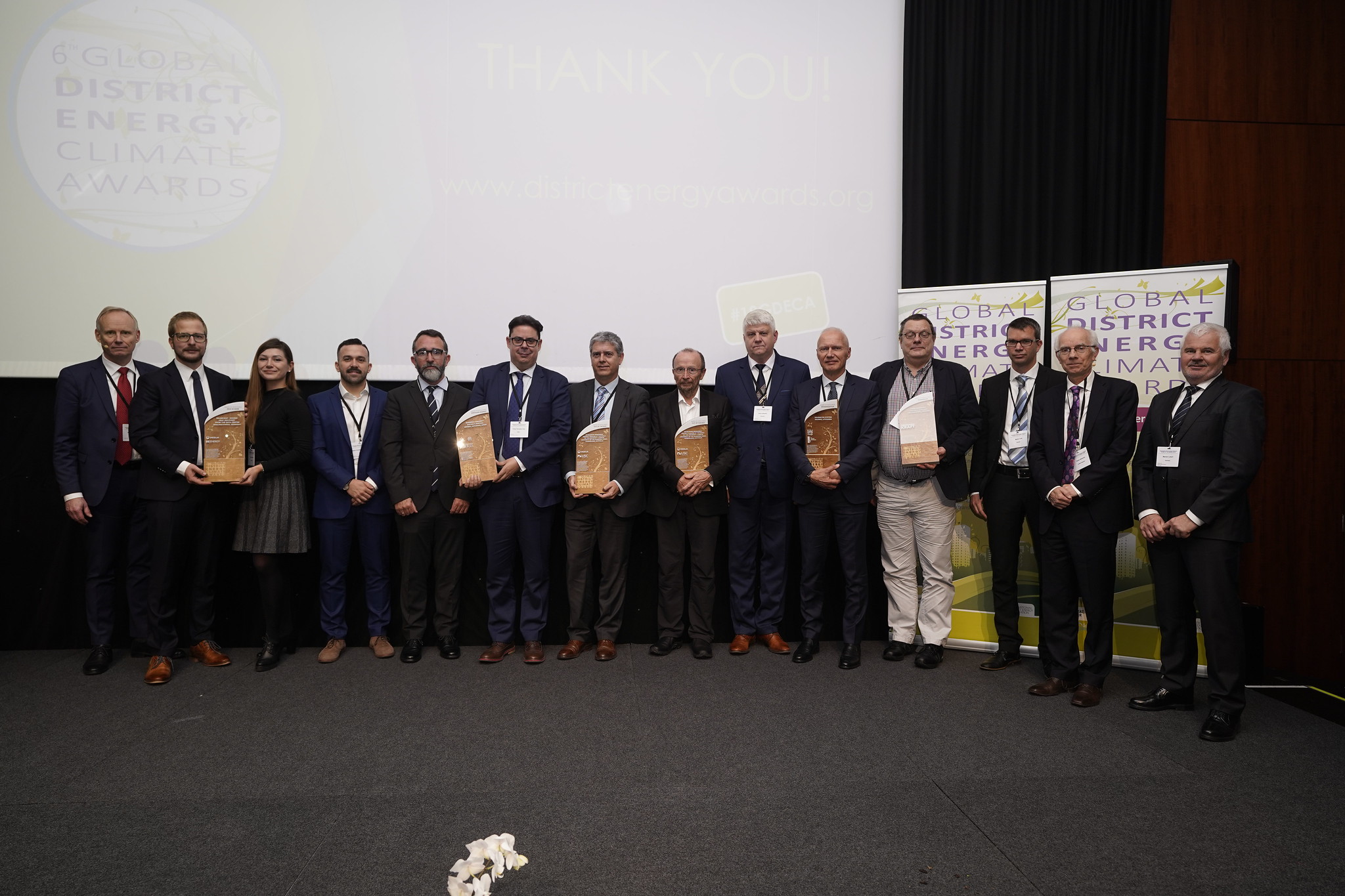
In cooperation with the International Energy Agency (IEA) technology network, the UN environment cities initiative and the representative organisations of the district energy sector decided to join forces and have the event 6th Global District Energy Climate Awards Ceremony on 24 October 2019, during the Sustainable District Energy Conference in Iceland. The finalists were selected from cities and communities across the globe which demonstrate local district energy leadership in providing clean and sustainable energy solutions. Over 100 professionals from organisations across the world met to celebrate success and collective attainment. Participants were honored by the presence of distinguished guests, Their Excellencies Mr. Dietrich Becker German Ambassador to Iceland, Mr. Håkan Juholt Swedish Ambassador to Iceland, Mr. Andrés Magnússon Lithuanian Honorary Consul, Dr. Margrét Jónsdóttir Spanish Honorary Vice-Consul.
Robin Wiltshire, Chairman of the evaluation panel of the 6th edition who is as well the chair of IEA Implementing Agreement on District Heating & Cooling, commented “This edition’s nominees covered an extraordinary range of schemes. The evaluation panel was very impressed with the quality of the applications submitted and the systems they represent. The awards winners show exemplary leadership in local district energy by providing clean, sustainable energy solutions, they should inspire other cities and communities to take the next steps!”.
The Global District Energy Climate Awards recognise systems that lead the way towards a resource-efficient, low-carbon heat supply and at this edition 5 awards were celebrated.
And the Winners are…
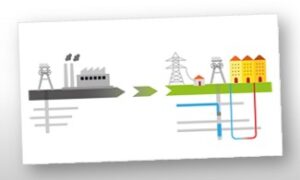 Emerging market – category highlighting the successful implementation of a District Energy system in a country that does not yet have an established District Energy market: “Barredo Colliery” District Heating | Mieres, Asturias, Spain. Mieres was coal mining city. This innovative project is managing the non-active collieries by using the water from the mines and harnessing its thermal energy. The network has a power capacity of about 2,2 MW, suppling energy to the heating systems and the domestic water. The new facilities are GHG-free and reach an annual CO2 emission reduction of over 600 tons. The network that is running, today, is becoming the largest geothermal heat network in Spain adding a total installed power, exceeding 6 MW, and more importantly it’s a starting point for future projects.
Emerging market – category highlighting the successful implementation of a District Energy system in a country that does not yet have an established District Energy market: “Barredo Colliery” District Heating | Mieres, Asturias, Spain. Mieres was coal mining city. This innovative project is managing the non-active collieries by using the water from the mines and harnessing its thermal energy. The network has a power capacity of about 2,2 MW, suppling energy to the heating systems and the domestic water. The new facilities are GHG-free and reach an annual CO2 emission reduction of over 600 tons. The network that is running, today, is becoming the largest geothermal heat network in Spain adding a total installed power, exceeding 6 MW, and more importantly it’s a starting point for future projects.
“The geothermal energy related to mine water is a renewable resource that has been created during more than a century of minning activities. The use of this resource is an innovative solution of Circular Economy creating from a problem (pumping costs) a source of wealth. The district heating installation centralizes the heat generation in the facilities of the extraction machine of Barredo Colliery preserving this valuable industrial heritage. This project provides a total reduction of 653.27 tons of CO2 per year with respect to the use of previous natural gas system.”
Felipe González Coto, Manager of Energy and Business Development, HUNOSA
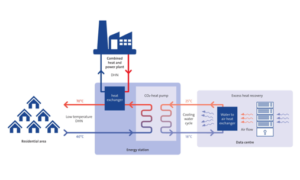 New scheme – category awarding the vision of a new, highly energy-efficient District Energy system: ReUseHeat – excess heat recovery from the data center | Braunschweig, Germany. The waste heat from a new data center is fed into an innovative, low-temperature district heating network. Before the recovered heat is injected into the network, its temperature will be raised by the heat pump from 25°C to 70°C. After having been utilized for space heating and domestic hot water production, the cooled water will then be returned to the heat pump to collect heat from data center once again. The system is designed to meet the base-load heat demand. The new residential development, which features 600 units, is also connected to the existing high-temperature district heating network through a heat exchanger. This innovative pairing will augment the efficiency of the heat pump while also reducing greenhouse gas emissions.
New scheme – category awarding the vision of a new, highly energy-efficient District Energy system: ReUseHeat – excess heat recovery from the data center | Braunschweig, Germany. The waste heat from a new data center is fed into an innovative, low-temperature district heating network. Before the recovered heat is injected into the network, its temperature will be raised by the heat pump from 25°C to 70°C. After having been utilized for space heating and domestic hot water production, the cooled water will then be returned to the heat pump to collect heat from data center once again. The system is designed to meet the base-load heat demand. The new residential development, which features 600 units, is also connected to the existing high-temperature district heating network through a heat exchanger. This innovative pairing will augment the efficiency of the heat pump while also reducing greenhouse gas emissions.
“The utilization of urban waste heat has tremendous potential. There are numerous sources of waste heat in cities, including data centers, which consume a great deal of electricity. In Braunschweig, we are recovering waste heat from a data center rather than merely discharging it into the environment. As part of the EU-funded ReUseHeat project, heat coming from the data center will be used for space heating in a new housing development. This solution will save some 1,284 MWh/a of primary energy, which is equivalent to 304 tons of CO2 emissions each year.”
Dominik Gehling, Head of technical department, Veolia Deutschland
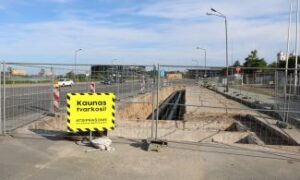 Modernization – category recognising the District Energy system that had the most positive impact in terms of effectiveness and efficiency after implementing technical, managerial, or operational modernization aspects: Kaunas DH system | Kaunas, Lithuania. Kaunas with almost 300,000 inhabitants is the second largest city in Lithuania. It is a large center of business, science and industry. AB Kauno Energija is the municipal District Heating (DH) system operator supplies heat to 3,500 businesses and organizations as well as to 115,990 households, in total – to 119,490 customers. In the last 5 years AB Kauno Energija invested heavily in the reconstruction of its own heat production facilities and network pipelines and used EU funds support. There are 9 biofuel combustion water heating boilers with total capacity of 85.3 MW operating in Kaunas integrated network including the implementation of 16 trunk pipelines building and reconstruction projects. Some biomass boiler-houses and CHP plants in Kaunas were built by independent heat producers.
Modernization – category recognising the District Energy system that had the most positive impact in terms of effectiveness and efficiency after implementing technical, managerial, or operational modernization aspects: Kaunas DH system | Kaunas, Lithuania. Kaunas with almost 300,000 inhabitants is the second largest city in Lithuania. It is a large center of business, science and industry. AB Kauno Energija is the municipal District Heating (DH) system operator supplies heat to 3,500 businesses and organizations as well as to 115,990 households, in total – to 119,490 customers. In the last 5 years AB Kauno Energija invested heavily in the reconstruction of its own heat production facilities and network pipelines and used EU funds support. There are 9 biofuel combustion water heating boilers with total capacity of 85.3 MW operating in Kaunas integrated network including the implementation of 16 trunk pipelines building and reconstruction projects. Some biomass boiler-houses and CHP plants in Kaunas were built by independent heat producers.
“Being awarded the 6th Global District Energy Climate Award is a great honour and recognition of efforts of our company and the city as well. With the significant contribution of independent heat producers, the usage of natural gas in Kaunas decreased radically from 95% to 10%, usage of renewables increased from 3% to 90%. CO2 emissions from AB Kauno Energija heat production facilities decreased by 27.7% from 29055 tons in 2012 to 21008 tons in 2018. One of the national goals of Lithuanian National Energy Strategy is to produce heat with zero CO2 emissions by 2050, i.e. to produce heat from renewables only. Following this objective Kaunas will seek to use local renewable resources prudently, install less polluting technologies, follow the environmental legislation and apply preventive measures to minimize the negative impact on the environment.”
Vaidas Šleivys, Interim General Director, AB Kauno Energija
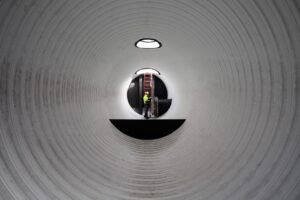 Expansion – category awarding the District Energy system that expanded to a new area or sector with excellence, delivering significant benefits to stakeholders: Öresundskraft District Cooling | Helsingborg, Sweden. Öresundskraft supplies District Cooling to a variety of customers in the downtown area. The system that has been in operation since 1999 has now been re-engineered to allow for an expansion to 30 MW (thermal) cooling capacity and to significantly improve energy efficiency and environmental performance. Öresundskraft makes through this initiative a sustainable and competitive cooling service available to customers on a city-wide scale by using sources that are renewable or that otherwise would be wasted. The major benefits of the project are reduced use of primary energy and reduced emissions of greenhouse gases due to increased energy efficiency and to using technologies avoiding the use of hydrofluorocarbons (HFCs) as refrigerants.
Expansion – category awarding the District Energy system that expanded to a new area or sector with excellence, delivering significant benefits to stakeholders: Öresundskraft District Cooling | Helsingborg, Sweden. Öresundskraft supplies District Cooling to a variety of customers in the downtown area. The system that has been in operation since 1999 has now been re-engineered to allow for an expansion to 30 MW (thermal) cooling capacity and to significantly improve energy efficiency and environmental performance. Öresundskraft makes through this initiative a sustainable and competitive cooling service available to customers on a city-wide scale by using sources that are renewable or that otherwise would be wasted. The major benefits of the project are reduced use of primary energy and reduced emissions of greenhouse gases due to increased energy efficiency and to using technologies avoiding the use of hydrofluorocarbons (HFCs) as refrigerants.
“On behalf of my professional colleagues at Öresundskraft, our environmentally conscious customers and the supportive city of Helsingborg, I would like to extend my sincere thanks for the Award of Excellence in the category Expansion. By using sea water, and by powering our equipment with recycled heat, we are able to double our production of district cooling while significantly reduce emissions of short-lived climate pollutants and our overall carbon footprint.”
Martin Tofft, Head of Business Area Power & Heat, Öresundskraft AB
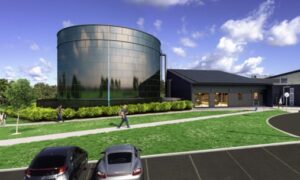 Out of the Box – category recognising significant innovation by underlining the importance of district energy for the success of the energy transition and fight against climate change: Developing Renewable District Cooling at the Scale of the University Campus | University of the Sunshine Coast, Queensland, Australia. SC in Queensland, Australia, has a target of achieving carbon neutrality by 2025. This project reduces the carbon footprint of the main campus by 42% by integrating 8.2MW cooling plant, 2.1MW rooftop solar with a 4.5ML chilled water storage tank and sophisticated controls. The project aims at using renewable energy sources for cooling of the campus, delivered through existing cooling network. This project provides a living laboratory on-campus, enabling students to gain first-hand knowledge and experience of sustainability, innovation and energy efficiency as part of their studies. Ultimately it was the strength of the partnership between USC and Veolia that underpinned the entire project. It was the combination of the sophisticated engineering design, the close partnership, and the innovative ownership agreement that have delivered an ‘out-of-the-box’ industry-leading solution to reducing the University’s carbon footprint.
Out of the Box – category recognising significant innovation by underlining the importance of district energy for the success of the energy transition and fight against climate change: Developing Renewable District Cooling at the Scale of the University Campus | University of the Sunshine Coast, Queensland, Australia. SC in Queensland, Australia, has a target of achieving carbon neutrality by 2025. This project reduces the carbon footprint of the main campus by 42% by integrating 8.2MW cooling plant, 2.1MW rooftop solar with a 4.5ML chilled water storage tank and sophisticated controls. The project aims at using renewable energy sources for cooling of the campus, delivered through existing cooling network. This project provides a living laboratory on-campus, enabling students to gain first-hand knowledge and experience of sustainability, innovation and energy efficiency as part of their studies. Ultimately it was the strength of the partnership between USC and Veolia that underpinned the entire project. It was the combination of the sophisticated engineering design, the close partnership, and the innovative ownership agreement that have delivered an ‘out-of-the-box’ industry-leading solution to reducing the University’s carbon footprint.
“Veolia and the University of the Sunshine Coast are honoured to receive global recognition for this landmark project. Winning the award reaffirms how innovative the project is and how we are collectively truly challenging the current state to forge a path to the future low carbon economy. The partnership exemplifies the sustainable and innovative cultures of both organisations. Importantly, it shows others the transition to a sustainable future can be made in an economically viable fashion when you harness the power of collaborative partnerships.”
Veolia and the University of the Sunshine Coast
***
END
Press contact: [email protected]
Latest News
-

-
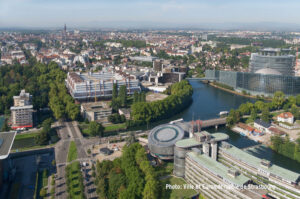 26.10.2021 Celsius Summit 2021 – Energy Democracy
26.10.2021 Celsius Summit 2021 – Energy Democracy

